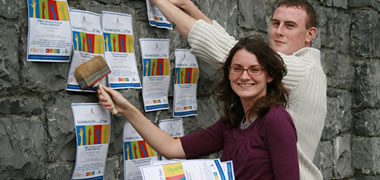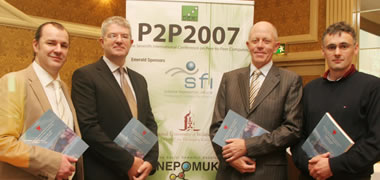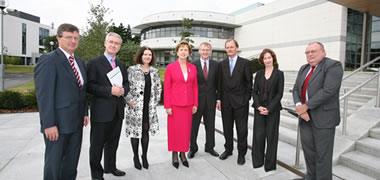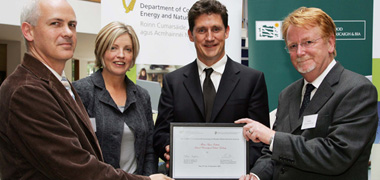-
Courses

Courses
Choosing a course is one of the most important decisions you'll ever make! View our courses and see what our students and lecturers have to say about the courses you are interested in at the links below.
-
University Life

University Life
Each year more than 4,000 choose University of Galway as their University of choice. Find out what life at University of Galway is all about here.
-
About University of Galway

About University of Galway
Since 1845, University of Galway has been sharing the highest quality teaching and research with Ireland and the world. Find out what makes our University so special – from our distinguished history to the latest news and campus developments.
-
Colleges & Schools

Colleges & Schools
University of Galway has earned international recognition as a research-led university with a commitment to top quality teaching across a range of key areas of expertise.
-
Research & Innovation

Research & Innovation
University of Galway’s vibrant research community take on some of the most pressing challenges of our times.
-
Business & Industry

Guiding Breakthrough Research at University of Galway
We explore and facilitate commercial opportunities for the research community at University of Galway, as well as facilitating industry partnership.
-
Alumni & Friends

Alumni & Friends
There are 128,000 University of Galway alumni worldwide. Stay connected to your alumni community! Join our social networks and update your details online.
-
Community Engagement

Community Engagement
At University of Galway, we believe that the best learning takes place when you apply what you learn in a real world context. That's why many of our courses include work placements or community projects.
2007
All 2007
NUI Galway Engineers host GLUAS workshop

Monday, 24 September 2007
- Future of Sustainable transport for Galway - The NUI Galway Department of Civil Engineering is to host a workshop on the future of transport infrastructure for Galway on Friday, 28 September in the Ardilaun Hotel, Taylor's Hill. The workshop will particularly focus on how Galway can become a sustainable city with the introduction of a Light Rail System. Professor Padraic O Donoghue, Dean of Engineering at NUI Galway said: "For many reasons, a sustainable, efficient transport system is essential for a city like Galway. This workshop will focus in particular on the light rail option and outline how this is one of the solutions that is relevant to us". "We are bringing in experts from other countries, as well as from Ireland to share experiences of the benefits and pitfalls of light rail schemes," said Professor Lewis Lesley, an international expert in the area, who will chair the event. The Official Opening will be conducted by the Mayor of Galway Cllr Tom Costello and speakers will include former Mayor Niall O Brolcháin; Professor Austin Smyth of Queens University; Lincoln Shields, former Director AMEC Construction; and Professor Lewis Lesley, TRAM Power Ltd. The workshop will be relevant to a wide audience including public representatives, those involved in providing and delivering transportation solutions and indeed the wider user community. Bookings for the day long event can be made by contacting the Department of Civil Engineering, NUI Galway at 091-492211 / 087-2383857 or email: seosamh.costello@nuigalway.ie Total seminar fee including lunch and refreshments is €75. ENDS
>> Read full story about NUI Galway Engineers host GLUAS workshop
NUI Galway Annual Volunteering Fair Largest Yet

Monday, 24 September 2007
Almost 2000 students are expected to attend the largest ever Annual NUI Galway Volunteering Fair on Thursday, 27 September. Over 50 charities and community organisations will have stands at the event which will be officially opened by Mayor of Galway City, Councillor Tom Costello. Exhibitors will include: the Alzheimer Society; Amnesty International; Big Brother Big Sister; Childline; Croí; Galway Refugee Support Group; Simon Community; Enable Ireland; and UNICEF. The fair will showcase a variety of volunteer opportunities such as: mentoring other students on campus; working in the Galway area with local community groups; fundraising for national charities; or volunteering abroad in a developing country. The Volunteer Fair is a joint initiative between the University's Student Services and NUI Galway's Community Knowledge Initiative, which runs a programme called ALIVE to encourage student volunteering. "This event is a wonderful opportunity to meet and share information and ideas. Over the years it has gone from strength to strength - thanks to the continued enthusiasm and support of our community partners. Our students contribute significantly to the social fabric here in Galway - whether it's running homework clubs for local schools, fundraising for charities, or befriending people with a disability. This fair is just one way to harness and encourage this ongoing civic commitment", said Lorraine Tansey, Student Volunteer Coordinator of ALIVE. Through the ALIVE programme, students at NUI Galway can access an online database of volunteer opportunities. The programme also runs a series of workshops to help students make the most of the volunteering experience. At the end of the academic year students can apply for an ALIVE Certificate which is awarded at a special ceremony in recognition of their commitment to volunteering. The event takes place on campus in Áras na Mac Léinn, from 1.30pm – 5.30pm. For further information, please contact the University's Community Knowledge Initiative on 091 493823 or email cki@nuigalway.ie. ENDS
>> Read full story about NUI Galway Annual Volunteering Fair Largest Yet
International Peer-to-Peer conference hosted by DERI Galway

Monday, 24 September 2007
NUI Galway s Digital Enterprise Research Institute (DERI) recently hosted the 7th International Peer-to-Peer Conference which was attended by over 100 researchers and experts from industry. Peer-to-peer (P2P) technology has come into the limelight recently with applications like Skype and collaboration applications like Groove. These applications critically depend on peer-to-peer technology which enables global scalability and robustness against failures at much lower costs than traditional data centre solutions as an application can make use of the computing resources of all participants. The next stage in its development will see the application of semantics to P2P technologies which will enable more effective inter-business communication and personal collaboration. The International Peer-to-Peer Conference is the flagship conference gathering for leading international experts from both academia and industry. High profile speakers at this year s conference included: Dr Sandeep K. Singhal, Director Windows Networking, Microsoft Corporation, who gave a tutorial on the Peer-to-Peer and Collaboration Platform used in Microsoft s Windows operating system; Dr Wolfgang Kellerer, Senior Manager Future Networking Lab, NTT DoCoMo Euro-Labs, whose keynote speech addressed The Bright Future of P2P: a Telecom Operator s Perspective; and Prof Karl Aberer, Director of the Swiss National Centre of Competence in Research - Mobile Information and Communication Systems, who discussed how P2P can be used to improve search engines. The uptake of P2P technologies by companies such as Microsoft and Skype clearly shows the relevance of P2P technology for modern software development. This significance is further emphasised by the sponsorship of the P2P conference by local industry including Cisco, Nortel and Storm Technologies. Local industry can benefit from such conferences showcasing the latest scientific developments in a cutting edge technology domain by networking with leading experts in the field as well as a place to recruit engineers with the relevant skills. Professor Manfred Hauswirth, Vice Director of DERI Galway, program chair and local organiser of P2P2007, said: "Local companies sponsoring and attending the conference have the opportunity to see what these highly qualified individuals have to offer. This in turn delivers a desperately needed injection of know how given the dramatically low numbers of Irish students in the ICT area." ENDS
>> Read full story about International Peer-to-Peer conference hosted by DERI Galway
President McAleese launches new research findings on health status and health ga

Friday, 21 September 2007
7-year research findings show current state of the health of the nation President Mary McAleese recently launched a supplement to the Irish Medical Journal that includes four scientific articles based on data from the Irish Health Behaviour in School-aged Children (HBSC) study. The HBSC study is conducted by researchers in the Health Promotion Research Centre at NUI Galway and is led by Principal Investigator Dr Saoirse Nic Gabhainn, and funded by the Department of Health and Children. The journal launched is based on the Health Research Board funded Unit for Health Status and Health Gain and includes new Irish findings on the health of the Irish population across the life-span, and what is important for good health in all age groups. The massive project conducted by the HRB Unit involved almost 40,000 people ranging from women in early pregnancy, to children, to the elderly and was carried out by research groups from NUI Galway and UCD. The research cover areas such as the dietary habits of pregnant women, the increased risk of eating disorders among Irish schoolchildren, the importance of interpersonal relationships as predictors of positive health among Irish pre-teens and teenagers, and the risk factors to health in grandparents. "The social and cultural changes underway in Ireland today pose enormous challenges across a wide spectrum of state activity, in particular where the planning and delivery of health and personal social services are concerned. The findings of this report will help us deal with this rapidly changing environment," said the President of Ireland, Mary McAleese. "The best way to deal with change is to prepare well and the work of this Unit will serve us well in that area.' Funding for the project was provided by the Health Research Board in 1999 in order to provide empirical evidence on the actual state of the nation's health. The findings will be used to help formulate Government strategy on health needs and to monitor changes in health expectancy among the Irish population, in line with key strategic objectives outlined by the Department of Health and Children in the 1994 policy document "Shaping a Healthier Future and the subsequent "Quality and Fairness, a Health System for You" in 2001." Before the HRB Unit was established there was very limited information available on the risk factors associated with ill health in the Irish population; particularly the social influences on those risk factors. The comprehensive research findings announced today bring together information from 12 surveys comprising 39,837 respondents across all walks of Irish life and at different life stages. It provides, for the first time, actual longitudinal evidence that will help in the planning of Irish health services into the future. The findings point to pockets of real disadvantage, especially in urban areas, and suggest that special policy effort must be made to reach the most disadvantaged groups and individuals in Irish society. Mother and child health – investment in early development As part of its work programme the Unit established a three generation family study called the "Lifeways Study" in 2001. This unique cross-generation study has over 3,500 family participants derived from 1,124 mothers who were recruited during early pregnancy. "The findings show a clear need for more concerted policy interventions by the health, education and social welfare sectors to support mothers and their families at early life stages," says Prof Cecily Kelleher, Head of the UCD School of Public Health and Population Science, who led the research of the HRB Unit for Health Status and Health Gain. "Investment at early life stages will pay great dividends in terms of future health benefits. The National Health Service in the United Kingdom has given this top priority and we also need to do so." By capturing information over a 5 year period, the 'Lifeways Study' enabled the researchers to investigate several areas of mother and child health including: dietary habits of pregnant women in Ireland; risk factor profile of grandparents; pre-pregnancy maternal body mass index and infant birth weight; and primary care utilisation rates in pre-school children. Socioeconomic differences in childhood primary care consultation rates had never before been examined in Ireland. The findings, from three years follow-up of over a thousand children show a strong inverse relationship between consultation rates in children and social class - higher utilisation rates among GMS (General Medical Service) cardholders. "The ratio of consulting rates among Irish preschool children, for GMS (General Medical Service) to paying patients, is so much lower than for adults," explains Professor Andrew Murphy, Professor of General Practice at NUI Galway, one of the principal investigators in the research. "Although consulting rates do significantly decrease with income increments, the differences are relatively small." "Policy and research perspectives suggest that all Irish pre-school children, irrespective of income level, should receive free primary care" he adds. In relation to dietary habits, the research findings show that while a reasonably high percentage of pregnant women are achieving the recommended daily intake of fruit and vegetables as set by the Health Promotion Unit's Healthy Eating Guidelines based on the food pyramid, less than 50% achieve the remaining daily dietary recommendations. According to the research, children of mothers with relatively higher fruit and vegetable intake and higher oily fish consumption are less likely to be effected by later childhood asthma (similar findings were produced in a recent study from the University of Crete). "These preliminary findings suggest an important new avenue for research in preventing asthma" says Professor Cecily Kelleher, Head of the UCD School of Public Health and Population Science. Peer influences and young people's health The Unit also investigated the influence of peer groups and peer relationships on the health of young school going children by analysing data from the 2002 Irish Health Behaviour of School Going Children (HBSC),"The findings suggest that by helping adolescents to build and maintain strong interpersonal relationships you are leading them to better health," says Dr Michal Molcho of NUI Galway, another of the principal investigators in the research. "The greater number of supportive relationships, the more positive the health of the adolescent." According to the study, positive supporting relationships are critically important for child health, and particularly the role of parents. "Supporting parents in their relationships with their children will help to improve the health of the child," continues Dr Molcho. The research also suggests that children who are most at risk from eating disorders are those children who are unhappy, who perceive themselves as not good looking, who have diet concerns, who are bullied more than twice per month, and feel that they are below average academically. "While it is necessary to treat eating disorders, there must be a shift in focus to prevent the onset of the disorder," says Professor Fiona McNicholas, Professor Of Child & Adolescent Psychiatry, UCD School of Medicine and Medical Science, another principal investigator in the research. "Introducing social, personal and health education into schools may go some way towards improving self-image and self-esteem among Irish school children," she continues. "But health professionals also need to play a role in preventing and detecting unhealthy eating attitudes and behaviours." Area Issues, disadvantage and social capital The work of the Unit also brings together, for the first time, several surveys which have assessed the relative influence of area disadvantage and social capital: the 2002 National Survey of Lifestyle Attitudes and Nutrition (SLAN), and the 2002 and 2005 European Social Survey. "While being personally disadvantaged was the main influence on health status, the research clearly shows that this is compounded by the deterioration of social facilities and amenities in certain urban areas," says Professor Kelleher. "All things being equal, people living in rural areas and older people reported better mental health than younger people" she adds. "Policy measures to improve health in certain deprived communities are outside the specific area of health," explains Dr Michelle Millar from NUI Galway, who as part of the research programme consulted people in disadvantaged areas for their views on what was most needed to improve their quality of life. "Moves to tackle such deprivation require a more holistic policy approach," she says. "Policy makers should heed the need to avoid ghettoisation and other poverty traps," explains Professor Kelleher. Policy actions for specific groups The recent work of the HRB Unit for Health Status and Health Gain also focused on discussing the value of targeting policy actions at specific groups to improve the health status of the Irish population. These groups highlighted were: children in early childhood, women, socio-economically disadvantaged groups and older people. "Evidenced based policy drawn from research overwhelmingly supports investment in early childhood interventions," says Dr Dorren McMahon, UCD Geary Institute, commenting on the research. "Returns from early childhood investment include better outcomes in education and health, increased work productivity and reduced crime rates." "Women in less well off socio-economic groups are at the greatest disadvantage with regard to health. They are at greater risk of developing poor health," says Geraldine Luddy, Director of the Women's Health Council. At present, the health of these women is compromised by lack of education, lack of information, and lack of awareness of factors that contribute to disease. "Specific policies must be developed to target this disadvantaged group." "The principles of involvement, participation and community development are central to tackling health inequalities and current health policy reflects this," said Elaine Houlihan from the Combat Poverty Agency. "We need to increasingly involve the communities that are experiencing health inequalities in consultation and participation. This will give those individuals who are receiving the services more of a say in how they are planned and delivered." "New opportunities for older people to maximize their capabilities in economic, social and civic life should be created and supported," says Professor Eamon O'Shea, Irish Centre for Social Gerontology at NUI Galway. "Health strategies must be developed in conjunction with the older people themselves and their advocates in a genuine spirit of partnership and intergenerational solidarity. -ends-
>> Read full story about President McAleese launches new research findings on health status and health ga
NUI Galway Marine Researchers Receive €9.2m in Government Awards

Thursday, 20 September 2007
NUI Galway marine researchers were yesterday awarded €9.2million in Dublin from the Minister for Communications, Energy & Natural Resources, Eamon Ryan T.D., and Mary Coughlan T.D., Minister for Agriculture, Fisheries & Food. The grants awarded, nearly €20 million in total, are named after Irish hydrographer Francis Beaufort, and will fund 141 researchers and students working in 5 research consortia, across 5 institutions. A consortium of research groups from National University of Ireland, Galway, University College Cork and Queens University Belfast, led by the Martin Ryan Marine Science Institute, NUI Galway, secured a substantial €7.2 million for research in Marine Biodiscovery. 80% of living organisms are found only in aquatic ecosystems, yet little is known about their biochemical characteristics. The Beaufort Marine Biodiscovery Consortium will aim to develop a leading capability in the utilisation of marine organisms and materials for the production of drugs, advanced biomaterials and neutraceuticals in Ireland. On receipt of the award Professor Michael Guiry, Director of the Martin Ryan Institute at NUI Galway, said: "Marine biodiscovery is a major opportunity for Ireland, particularly for the west of Ireland, which is one of the most biodiverse marine areas in the European Community, and we look forward to working with our partners in the Marine Institute in Oranmore, UCC, and Queen's University Belfast. The Government, and in particular the Departments of Communications, Energy & Natural Resources and Agriculture, Fisheries & Food have shown great foresight in funding this programme for 7 years under the SeaChange programme. Scientific innovation is indeed the key to unlocking economic success." The Centre for Rural Transformation and Sustainability at NUI Galway secured €2 million for Marine Socio-Economic Research. The Beaufort Marine Award in Socio-Economic Research will establish for the first time in Ireland's history, the research leadership and capacity required to assess and quantify the economic, social and environmental value of our significant marine resources. Professor Michael Cuddy, Director of the Centre for Rural Transformation and Sustainability at NUI Galway said: "This is a unique opportunity to address socio-economic issues important to the economic sector in Ireland which will underpin the SeaChange strategy." - ends-
>> Read full story about NUI Galway Marine Researchers Receive €9.2m in Government Awards















